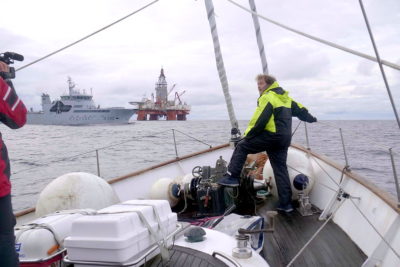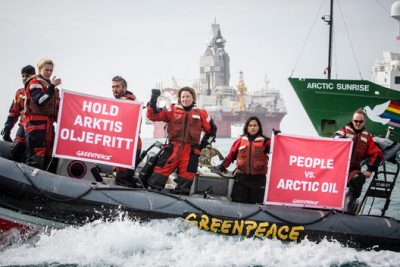Top Norwegian politicians are defying calls from the International Energy Agency (IEA) to halt more investment in new oil fields. Both the Conservatives and the Labour Party say they still don’t see any reason to revise oil policy, while a string of climate and environmental advocates suggest the political leaders are simply in denial mode.

“What we’ll be seeing from the Conservatives, Labour and the Progress Party is denial,” Frederic Hauge, leader of the environmental organization Bellona, told newspaper Aftenposten on Wednesday. “They haven’t even wanted to comment on this,” Hauge added, referring to the landmark IEA report issued on Tuesday that’s being called a “game-changer” not only by climate activists but also by economists, more climate-oriented politicians and even a representative of Norway’s own oil and gas industry.
“The report is a marching order,” Hildegunn Blindheim of Norsk olje og gass told Aftenposten. “I think this will change the discussion.” She said the industry “knows” that in the future, oil will be used less for burning as fuel and more as a component in production of, for example, plastics. Only oil companies that manage to produce oil at the lowest cost and with the lowest emissions will be able to remain competitive, Blindheim said.
“We as a branch can contribute with more emission reductions and low- and zero-emission solutions for sectors that can’t be electrified,” Blindheim added. She thinks the IEA’s new “roadmap” to net-zero emissions by 2050 points to many of the technological solutions and possibilites the Norwegian petroleum industry is already developing like offshore wind power, carbon capture and storage and emission-free hydrogen production from natural gas.
‘Strong and clear signal’
Climate and environmental leaders in Norway were applauding the IEA report, calling it especially significant since the IEA has traditionally worked with the oil industry, not against it. “This is a strong signal from the IEA to the nations of the world,” said Frode Pleym of Greenpeace Norge. “They have never said this so clearly before, that exploration is no longer a central premise. That should be a real wakeup call for Norwegian oil policy.”
The chief economist for Norway’s national employers’ organization NHO was among those startled by the bluntness of the IEA report, while Norway’s chapter of WWF, long worried about the hazards posed by Arctic oil drilling and production on wildlife, claimed the report was “another nail in the coffin” for the government’s pro-oil argumentation. “It’s about time they park the Arctic ventures, once and for all,” Ragnhild Waagaard of WWF told business news service E24. She also believes the IEA report changes the premises of the oil debate.

Hauge of Bellona said he doesn’t think top Norwegian politicians, keen on more economic growth and job creation, want to take in the signals from the IEA, that more oil and gas fields won’t be needed in a zero-emission world. Initial response from Norway’s “steering parties” confirmed that.
Oil Minister Tina Bru of the Conservative Party, who initially didn’t want to interviewed about the report, later stressed that Norway’s oil industry remains among the “cleanest” in the world, and that its technology will be needed in the years to come. She claimed the government was “prepared” that the world must dramatically cut its consumption of coal, oil and gas. Norwegian offshore oil ventures will, however, continue to be important for development of the renewable sector, like offshore wind turbines.
“If this (IEA) roadmap becomes a reality, it will of course influence Norwegian oil and gas production,” she conceded, “along with oil companies’ interest in searching for new oil sources.” She believes, however, that “it wouldn’t make a difference from a global perspective” if Norway were to cut its oil development now. “On the contrary, we could lose the important technology and competence we need for economic restructuring,” she said as she mounted a creative defense of ongoing oil industry expansion.
‘No reason’ to halt oil exploration
It was no surprise that the Conservatives’ former government partner, the right-wing Progress Party, also sees “no reason” to halt oil exploration and production or change Norwegian petroleum policy now. The Center Party has also long supported the oil industry. “The first thing that must be phased out is coal,” Progress’ energy policy spokesman Terje Halleland, told E24. “That will increase demand for oil but especially gas.” If Norway were to say “no” to more exporation or put other limitations on production, Halleland said, “it would have grave consequences on the sector.
“I think the best thing that can happen for Norway is that we maintain the petroleum policy and operations that we have,” he added. “It’s important to provide for a green transition, but now there are so many different projects going that we can’t do anything that would reduce their chances of succeeding.”

Nor does Espen Barth Eide, a Member of Parliament and energy policy spokesman for the Labour Party, see any need to halt exploration. He hailed the IEA and said the report sent a “powerful” message, but Eide told newspaper Dagens Næringsliv (DN) that it won’t change Labour’s own oil policy or his view “that we in Norway should not set a politically mandated” date to stop exploration.
“I think we should maintain the goal of wise oil policy that understands the new trends and first and foremost builds bridges to what we’ll do afterwards,” he said, referring to when Norway’s oil will run out. He also said it was important not to “over-invest” and then be left with costly “stranded assets” from exploration projects that didn’t produce any oil or gas. Norway currently, and controversially, subsidizes oil companies’ exploration costs.
Others, including several newspaper commentators, accused the politicians of putting their heads in the sand. “Norway must say ‘no’ to new oil and gas fields,” wrote Terje Erikstad, finance editor in newspaper Dagens Næringsliv (DN). “No new projects should be approved after 2021.” He argues that what’s most important is that meeting climate goals will have positive effects in a world that won’t need so much oil any longer.
Pleym of Greenpeace clearly agreed: “Politicians have ignored the climate researchers for far too long, but they should not ignore the IEA.”
newsinenglish.no/Nina Berglund

